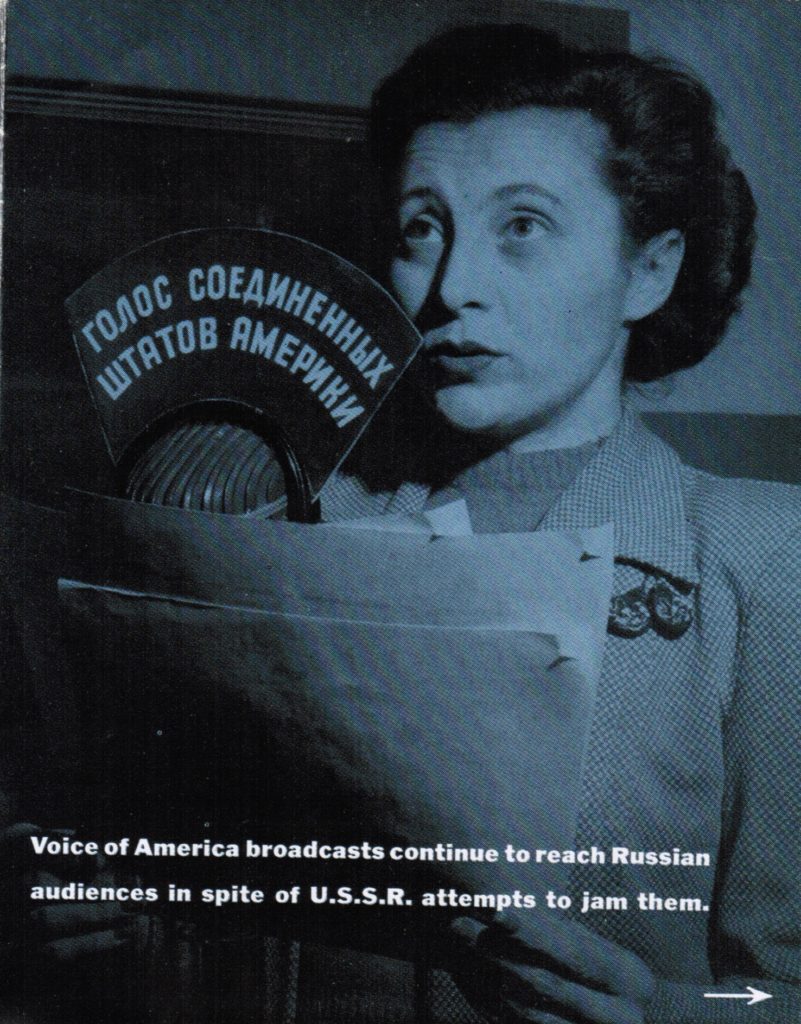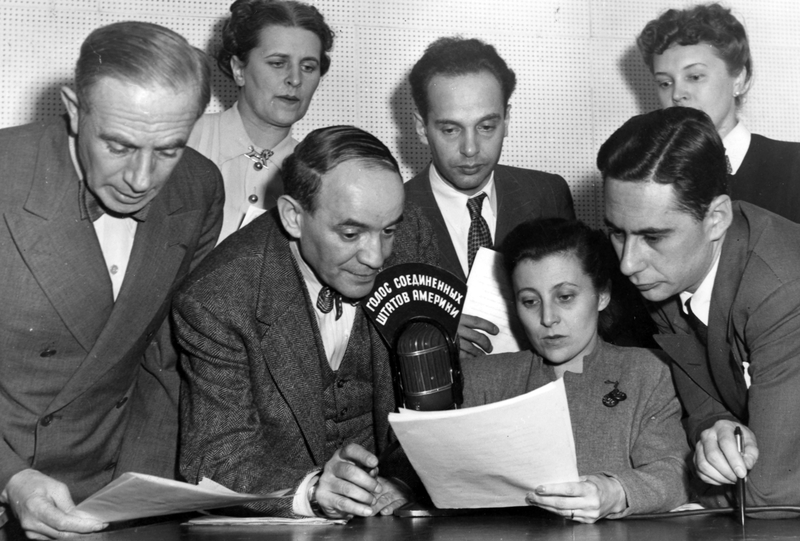Voice Of America Launched Long-Delayed, Soft Broadcasts to Soviet Russia
The first Voice of America broadcast in Russian aired from New York on February 17, 1947. Before that date, VOA did not broadcast in Russian or in Ukrainian, not even during World War II. Russian was the only major language missing in the VOA wartime broadcasting schedule. The official reason for this curious exclusion was not announced, but many guessed that the Roosevelt administration did not want to offend Soviet communist dictator Joseph Stalin after he became America’s military ally against Nazi Germany. Earlier, Stalin helped Hitler start World War II with their attacks on Poland in September 1939. The Stalin-Hitler alliance lasted until June 1941.
The first VOA Russian broadcast on February 17, 1947 did not include criticism of Stalin or repressions in East-Central Europe, where local communist regimes were subservient to the Kremlin. It took criticism from members of Congress of both parties, U.S. media, and leaders of ethnic communities to prompt personnel and programming reforms at VOA.
The Truman White House was not happy with Voice of America programs after widespread criticism that they were soft on communism and the Soviets. According to Edward Carleton Helwick, Jr., who had worked for VOA as an English-language writer-producer and later compared VOA programs in 1947 with those in 1950-1953, VOA’s first Russian-language broadcast did not include outside of the newscast any criticism of Soviet leaders or an analysis of human rights issues under communism. Helwick also observed that mainstream U.S. media outlets were also not impressed with the direction and tone of the first VOA Russian broadcast from New York in February 1947.
It was evident from newspaper accounts that the broadcast in America, at least, was received with something less than enthusiasm. Typical of the reactions the New York World Telegraph headline, “Russians Restrain Joy over U.S. Broadcast.”[ref]Edward Carleton Helwick, Jr., “Policy problems of the Voice of America: 1945-1953.” Master Thesis, Department of Political Sciences, University of Southern California, June 1954, pp. 218-219.[/ref]
Charles Thayer, the State Department Foreign Service Officer put in charge of launching VOA Russian broadcasts in February 1947 and later VOA director, was apparently deceived by Soviet propaganda and believed the Kremlin’s lies designed to absolve Stalin for his responsibility for mass murders.[ref]Ted Lipien, “Secret Memos on How Voice of America Was Duped by Soviet Propaganda on Katyn Massacre,” Cold War Radio Museum (blog), May 2, 2021, http://www.coldwarradiomuseum.com/secret-memos-on-how-voice-of-america-was-duped-by-soviet-propaganda-on-katyn-massacre/.[/ref]
Thayer was forced later to resign from the Foreign Service. Early VOA Russian broadcasters, many of whom were anti-communist, were not allowed to criticize the Soviet Union when Thayer was in charge of the Russian Service. One of them, Helen Zhemchuzhny Bates Yakobson (1913-2002), noted this in her memoir published in 1994.

In those early years, VOA programs attempted to give full and impartial reports of life in the United States, including confessions of our shortcomings and faults. No direct criticism or attacks on the Soviet system were permitted. After all, they had only recently been our allies. But as the Cold War intensified, VOA responded and became openly and vigorously critical of the Soviet system and government.[ref]Helen Yakobson, Crossing Borders: From Revolutionary Russia to China to America (Tenafly, N.J: Hermitage Publishers, 1994), 146.[/ref]

The later head of the VOA Russian Branch, a pre-World War II Soviet defector Alexander Gregory Barmine, a former Red Army general, was strongly anti-communist. He told the Senate Permanent Subcommittee on Investigations, chaired by Senator Joseph McCarthy (R-WI), otherwise infamous for making many false accusations of communist influence within the US government, that he received instructions to play down the anti-Semitism of the Soviets.[ref]Voice of America: Report of the Committee on Government Operations Made By Its Senate Permanent Subcommittee on Investigations, Washington: United States Government Printing Office, 1954, p. 9.[/ref]
The Truman Administration later removed such restrictions. The Senate Permanent Subcommittee on Investigations, while highly critical of the earlier management of the Voice of America in the State Department concluded in 1954 that some VOA scripts “particularly those from branches under the direction of such knowledgeable anti-Communists as Alexander Barmine of the Russian Division and Gerald F. P. Dooher of the Near East, South Asian Division, were most impressive.”[ref]Voice of America: Report of the Committee on Government Operations Made By Its Senate Permanent Subcommittee on Investigations, Washington: United States Government Printing Office, 1954, p. 5.[/ref]
Such a conclusion would not have been possible from a highly anti-communist Senate subcommittee if the Truman Administration did not initiate managerial and programming reforms at the Voice of America.
After President Truman’s “Campaign of Truth” speech, Secretary of State Dean Acheson said in his semiannual report to Congress on the International Information and Educational Exchange Program for the period July 1 to December 31, 1950, that “Operationally, launching of the Campaign of Truth was reflected at the outset more in sharpened program content and specialized radio treatment than in marked increases in broadcast operations.”[ref]Dean Acheson, U.S. Secretary of State, “Launching the Campaign of Truth–First Phase: Sixth Semiannual Report of the Secretary of State to Congress on the International Information and Educational Exchange Program, July 1 to December 31, 1950,” Department of State Publication 3479, December 1951, p. 3. https://hdl.handle.net/2027/umn.31951d03562370p?urlappend=%3Bseq=8.[/ref]
Acheson indirectly agreed with critics that earlier VOA programming to the Soviet Union was not well-planned to meet the Soviet propaganda challenge. Jamming was not the main factor for the need to change VOA’s programming policy. The Stalinist regime was just as murderous in 1947, when the VOA Russian broadcast was finally started, as it was in the second half of 1950, the period covered by Acheson’s report to Congress.
In the broadcasts to Eastern Europe, greater program variety was introduced; more liberal use was made of anti-Communist political satires and exposés, and of the documentary and dramatized technique.
The systematic jamming of VOA’s Russian broadcasts greatly influenced both their content and format. Music and dramatizations were eliminated, and the salient portions of the programs were repeated around the clock. Later in the period, when a partial neutralization of the Soviet jamming effort was achieved, some of the dramatized material was restored. An increasing number of Soviet DP’s came to the microphones of VOA to tell their story.[ref]Dean Acheson, U.S. Secretary of State, “Launching the Campaign of Truth–First Phase: Sixth Semiannual Report of the Secretary of State to Congress on the International Information and Educational Exchange Program, July 1 to December 31, 1950,” Department of State Publication 3479, December 1951, p. 4. https://hdl.handle.net/2027/umn.31951d03562370p?urlappend=%3Bseq=11.[/ref]
At least, Secretary Acheson admitted that VOA’s program content was previously not sufficiently sharp, but progress to fix the problem was not quick within the government bureaucracy. Whistleblowers and members of Congress continued to report questionable programming at VOA for at least two more years.[ref]“Voice of America 1951 – ‘Drab’ ‘Unconvincing,’” Cold War Radio Museum (blog), February 24, 2018, https://www.coldwarradiomuseum.com/voice-of-america-1951-drab-and-unconvincing-rep-wigglesworth-quotes-voa-listeners-in-poland/.[/ref]
The Voice of America improved its radio broadcasts to the Soviet Bloc later in the 1950s but did not expand them substantially, except for Russian-language programs. Even adding extra time to VOA Russian broadcasts took several years since their inception in 1947.

